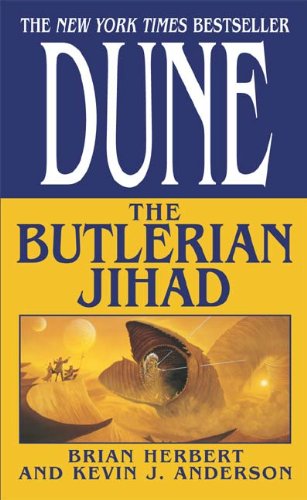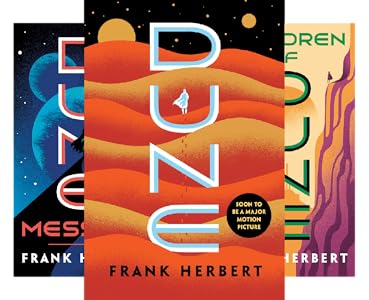
![]() The Butlerian Jihad by Brian Herbert & Kevin J. Anderson
The Butlerian Jihad by Brian Herbert & Kevin J. Anderson
As one would expect, Dune prequel The Butlerian Jihad, by Brian Herbert and Kevin J. Anderson, doesn’t match the original but it’s unfair of course to compare this work (the single book or the entire trilogy) to the original DUNE series, which well deserves its place in science fiction history. One of the ways to somewhat neutralize the natural temptation of readers to compare is to delve so far back into the history of DUNE that you are working from an almost clean slate, which is what Andersen and Herbert do with their newest prequel trilogy, set several millennia previous to Dune‘s world. If it doesn’t hold up to the original, how does it stand as its own novel? The answer is not bad, but not great.
 The strong points of The Butlerian Jihad are the plot and structure. While the book probably could have used some cutting, its length is not unreasonable for its story. The structure, which cuts between several independent though eventually converging plotlines and characters, is well-suited both to the book’s complexity (allowing for lots of information to be conveyed in manageable chunks) and length (adding suspense by cutting away at prime moments). And the plot is interesting in its own right, beyond being a simple nod to the “I want to see how they explain where this came from” readers of Dune. One of the grave dangers of prequels is that one ends up with a work wholly contrived to connect the future dots, a book where the author just has to fill in the blanks — mention this legend here, drop this name there, explain the origin of this ritual over there. For the most part, the authors avoid that here, and even in the rare instances where you have the feeling it’s happening, it’s over relatively quickly and painlessly. (I actually thought it was more noticeable in the second book of the series.)
The strong points of The Butlerian Jihad are the plot and structure. While the book probably could have used some cutting, its length is not unreasonable for its story. The structure, which cuts between several independent though eventually converging plotlines and characters, is well-suited both to the book’s complexity (allowing for lots of information to be conveyed in manageable chunks) and length (adding suspense by cutting away at prime moments). And the plot is interesting in its own right, beyond being a simple nod to the “I want to see how they explain where this came from” readers of Dune. One of the grave dangers of prequels is that one ends up with a work wholly contrived to connect the future dots, a book where the author just has to fill in the blanks — mention this legend here, drop this name there, explain the origin of this ritual over there. For the most part, the authors avoid that here, and even in the rare instances where you have the feeling it’s happening, it’s over relatively quickly and painlessly. (I actually thought it was more noticeable in the second book of the series.)
The weak point of the book, as is often the justifiable complaint with science fiction, is the characterization. Too many characters feel plot-driven or two-dimensional. And one of the major characters, the Atreides heir, is simply unbelievable in his transition. One would think that in a 500+ page book there could be some more allowance for slower, more realistic character development, but sadly that’s not the case here (check out Scott Westerfeld‘s The Risen Empire/SUCCESSION for a great example of how to do more characterization in half the space). The lack of good characterization detracts from an otherwise well-told story (especially in that unfair comparison to the original series), but it doesn’t get too much in the way of enjoying the story on its own right, or in getting some answers to the questions DUNE fans have been asking for decades.



I've thought about picking that one up. The artwork looks perfect.
I like the way you think, Bill. I found the second one particularly objectionable; the one with Khan. It was…
I find if I take every Trek reference out of them (the title, the character names, the ship names, etc.),…
I loved this deep dive into Edwige Fenech's Giallo films! Her performances add such a unique flavor to the genre.…
It would give me very great pleasure to personally destroy every single copy of those first two J. J. Abrams…